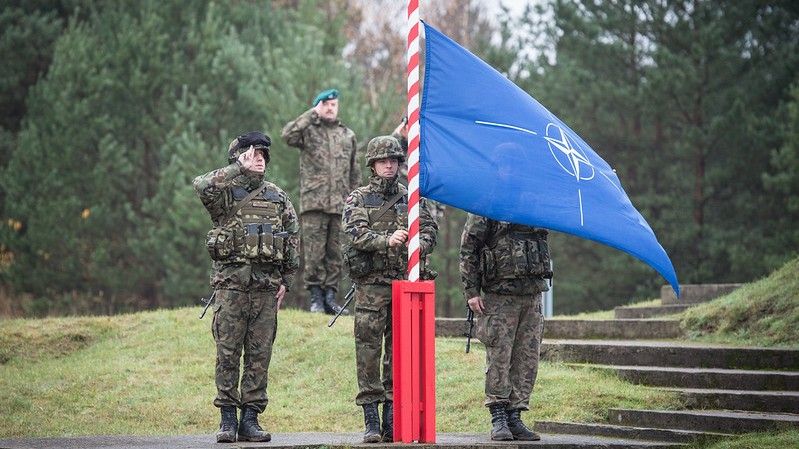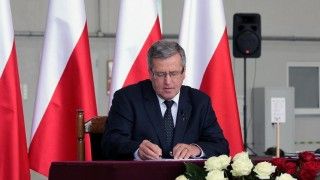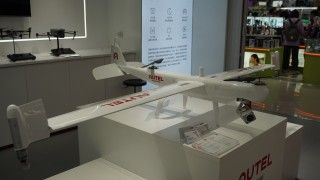- sponsorowane
- WIADOMOŚCI
- WYWIADY
Attacks on governments and companies. Protection used by NATO troops
Poland is one of the main countries targeted by hostile hacker attacks. Operations are aimed not only at the military and administration, but also business. It is worth taking care of security and reaching for a solution that is used by, among others, NATO armed forces.

Photo. U.S. Army Europe/Flickr/Public domain
Sponsored material
CyberDefence24: How was Goldilock founded and what is the main product?
Steven Brodie, Chief Revenue Officer atGoldilocks:: The surge in connectivity over the past decade has given rise to a new era of sophisticated cyber threats. The proliferation of IoT devices, cloud migration, and AI innovations has made individuals, businesses, and governments increasingly vulnerable to cyberattacks, and the cyber security industry is stuck in a spiralling arms race to counter threats as they evolve.
Recognising this growing risk, Tony Hasek (CEO) and Stephen Kines (COO) founded Goldilock in 2018. Their previous experiences with the cryptocurrency industry highlighted the significant security vulnerabilities associated with storing valuable digital assets, and from that point on, they were determined to address this fundamental issue.
Goldilock offers a unique, easy-to-use yet incredibly powerful solution that leverages physical network disconnection. Our »FireBreak« flagship product is a hardware-based approach that enables customers to completely isolate their networks from the internet, providing unparalleled security against cyber threats. Using DPNS (Dynamic Physical Network Segmentation) technology, users are able to physically segment their digital assets, devices, networks, and operational control systems remotely, instantly and without having to use the internet to do it. The ethos is »disconnect to protect«, because anything not online can’t be breached. By empowering businesses to regain control over their digital infrastructure, we aim to safeguard critical data and systems in an increasingly interconnected world.
Where are Goldilock devices currently deployed?
S.B.: Created to be that layer-1 foundational protection in any cyber security set-up, FireBreak is suitable for an incredibly diverse set of use cases, markets and sectors. Our technology is being used in defence and security, for example in Ukraine with their Cyber Command, and also safeguards essential services and critical national infrastructure (CNI), such as water, gas, and electricity.
Elsewhere some examples include securing sensitive data for fintech companies and other financial institutions, safeguarding patient records and critical medical systems in healthcare, and protecting industrial control systems and sensitive production data in manufacturing.
Geographically, our solutions are deployed globally across the Americas, Europe, the Middle East, Africa, and the Asia-Pacific region.
How important is it that your devices are certified by NATO, manufactured in Europe, and use certified components?
S.B.: The certification by NATO, European manufacturing, and the use of certified components are all absolutely critical to the integrity and security of our devices. These factors ensure the highest level of trust and reliability.
Our technology is so innovative and unique that it has necessitated updates to industry standards like the Common Criteria. This cutting-edge technology has led to partnerships with some of the biggest defensive institutions on the planet such as NATO, DASA, and the UK MOD, further validating its security and reliability.
One of the founding principles of our company was to build a secure supply chain. To ensure this, our products are manufactured in NATO member countries, using certified components sourced from trusted suppliers. This approach mitigates risks associated with supply chain attacks and guarantees the safety and reliability of our solutions. So to answer the question, how important is it? It’s non-negotiable, and ultimately, it’s all about protecting our clients and ensuring the safety of their operations.
How does the NATO Incubator work, and how can one get involved? Also, if a Polish company wanted to join the NATO Incubator, how could they do that?
S.B.: There are several different incubators within NATO, but we were part of NATO DIANA, a prestigious programme that supports innovative startups and scale-ups. As one of the few winning companies and the only winning cybersecurity-focused company from the first cohort, we’ve benefitted greatly from this programme’s support.
To learn more about the NATO DIANA programme, including specific timelines and application details, I recommend visiting the official NATO DIANA website, which will provide the most accurate and up-to-date information. But in a nutshell, the programme is designed to accelerate the development of dual-use technologies (those that can be used for both civilian and military purposes). It provides a unique platform for startups and scale-ups to connect with NATO experts, industry leaders, and investors. Through our participation, we gained access to experienced mentors from the defence and technology sectors, financial support to help our company grow and develop, and access to testing facilities and real-world environments to validate technology.
For Polish companies interested in joining the NATO Incubator, I strongly encourage them to apply. Even the application process itself can be valuable, as it provides an opportunity to learn more about your company and connect with other innovative organisations working to make a positive impact in the world.
Is disconnecting from the internet in the event of an attack the quickest way to stop the attack?
S.B.: Stopping an attack before it happens is the ideal solution. If that’s not possible, I can think of no quicker way to mitigate the damage than disconnecting from the internet and containing the threat. Before our product came to market, the go-to method was „pull the cable” or „power it off”, which can be disruptive and time-consuming.
Our FireBreak technology offers a more proactive and efficient approach. Not only does physically isolating (or air-gapping) networks allow you to dramatically minimise your attack surface and prevent attacks from happening in the first place, but it also allows for an instant network disconnect in the case of an attack or incident, minimising potential damage. Attacks are more likely to be prevented because the solution allows for granular control over network connectivity, enabling organisations to selectively disconnect specific networks or systems while keeping others online as needed.
Let’s consider the recent CrowdStrike incident, which had far-reaching consequences, including disruptions to critical infrastructure like aviation. Had FireBreak technology been deployed, the faulty patch that triggered widespread system failures would have been prevented from deploying without local administrator approval. This would have significantly mitigated the impact of the incident.
What is the advantage of controlling a device via SMS, which has no IP address?
S.B.: Using SMS as a control mechanism offers several advantages. Firstly, SMS itself is a non-IP based trigger, so it provides an out-of-band method of communication, bypassing the traditional TCP/IP network. This reduces the attack surface and makes it more difficult for malicious actors to exploit vulnerabilities. Secondly, SMS-based control offers a reliable and secure way to manage devices, especially in remote or low-bandwidth environments. This allows for remote management of devices without exposing them to direct network attacks. Overall, using a non-IP-based communication channel helps to minimise the risk of cyberattacks and ensure the integrity of critical systems.
Do you think solutions like Goldilock will become NATO’s standard in the future?
S.B.: I believe solutions like Goldilock will become a standard, not just for NATO, but for all organisations. By adding an extra layer of defence that hasn’t existed before, we can significantly enhance our efforts in the cybersecurity fight. As organisations recognise the simplicity of deployment, use, and management of physical network isolation, they will increasingly see the value of this technology in ensuring operational continuity. This will ultimately drive the adoption of such solutions as a must-have for all.
What is the origin of the company and its founders (residence, ownership structure, security, and business continuity)?
S.B.: Goldilock is a British cybersecurity company established in 2020. The two founders are Tony Hasek and Stephen Kines both former Candian Military. Goldilock participated in the UK’s National Cyber Security Centre’s #NCSCForStartups program and was accelerated through the Ministry of Defence’s Defence and Security Accelerator (DASA). The company was later selected for the NATO Defence Innovation Accelerator for the North Atlantic (DIANA) program, which funds startups developing technologies to protect critical infrastructure from cyberattacks.
What experience and references can you provide (implementation of projects in sectors other than cryptocurrencies, including the defence sector – military, services, industry)?
S.B.: Goldilock’s solutions are designed to protect critical military and civilian infrastructure, including energy grids, water facilities, and industrial systems. An example of this technology in action is its implementation in British hospitals, where it keeps medical equipment offline and protected until needed, ensuring continuity and safety of healthcare operations. Another example is with the Banking sector ensuing its operational resilience is at its highest level for access and back up systems whilst also reducing the companies attack surface from cyber threats. Additionally, Goldilock’s solutions are used within NATO military forces to secure critical systems; however, for obvious reasons, details of these implementations cannot be disclosed.
Are Goldilock’s solutions already used by Polish organizations (business, administration, services, military)?
S.B.: Goldilock solutions have been successfully tested in Poland, as well as in other NATO-approved labs located in Italy, Canada, the U.S., and other member countries within the 32-nation alliance. One being CR14 in Estonia. While Goldilock is still relatively new in Poland, as in many parts of Europe, we are already seeing significant interest in our products. Poland, as a NATO frontline country, faces a substantial number of cyberattacks, especially given the conflict beyond its eastern border. Therefore, Poland has a strong understanding of the importance of cybersecurity. We are currently engaged in several Proof of Concept (POC) projects in Poland.
As a final question what is the sales/distribution model for Goldilock’s solutions?
S.B.: Goldilock operates on a channel-only business model, enabling partners to deliver its hardware-based security solutions efficiently to customers across diverse industries. In Poland, Goldilock has an distribution agreement with Pedab Poland, which is part of the Pedab Group. Pedab also serves as the main distributor for Goldilock in the Nordic and Baltic regions. In Poland, the primary contact for our solutions is Paweł Radzimski from Pedab Poland. Pedab Poland has demo units readily available and can provide full support, including answering inquiries and organizing product demonstrations for potential clients.

















